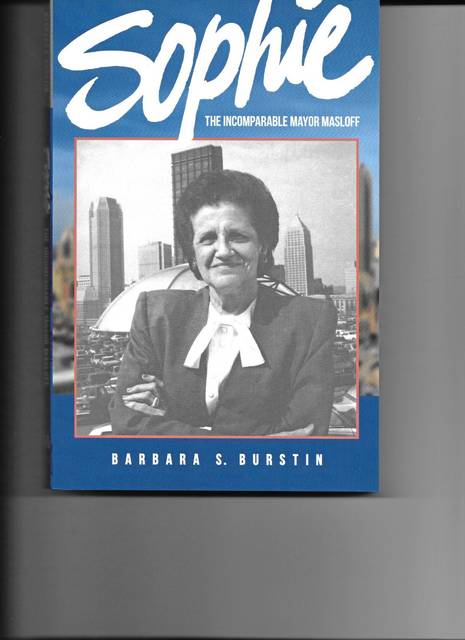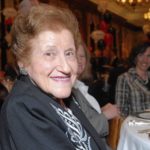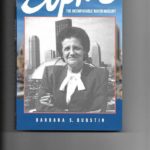For historian Barbara Burstin, researching the life of Sophie Masloff, Pittsburgh’s first female and Jewish mayor, was a fascinating and rewarding project. She sees Masloff’s story of overcoming poverty, sexism and anti-Semitism as inspiring to everyone.
Masloff served as mayor from 1988 to 1994. “Her story is a reflection of the American dream,” Burstin said. “You can move forward. There are opportunities. You can rise. Mobility in America is still a reality.”
Burstin’s biography, “Sophie: The Incomparable Mayor Masloff,” was released last month through Word Association Publishers, based in Tarentum. Burstin, who teaches at the University of Pittsburgh and Carnegie Mellon University, conducted all the research and writing independently.
Adam Hertzman, director of marketing for the Jewish Federation of Greater Pittsburgh, said Masloff’s rise to the office of mayor has made her a symbol of hope and empowerment for the city’s Jewish community. She represents the contributions of Jewish people to the development of Pittsburgh’s story. “The confluence of being a female mayor and a Jewish mayor was an important step in the history of the U.S.,” Hertzman said.
Masloff was popular mayor who did not shy from controversy. She led the city during a crippling economic crisis, when young families and corporate headquarters were moving out of town. Masloff had to wade through constant challenges to keep Pittsburgh afloat, Burstin said.
Born in 1917 to Romanian immigrants, Masloff grew up in poverty in the Hill District. Her father, Louis Friedman, died when she was 5, leaving her mother, Jennie, supporting four children alone. Masloff spoke Yiddish at home; her mother didn’t learn to read or write in English.
She had no pedigree, no family connections, Burstin said, but she rose through the ranks. After graduating from Fifth Avenue High School in the Hill District, Masloff skipped college and began working as a clerk in the Allegheny County Courthouse. She worked there for nearly four decades years before joining Pittsburgh City Council in 1976.
In 1988, serving as city council president, she became mayor upon the death of Mayor Richard Caliguiri. After finishing Caliguiri’s term, she ran for another in 1989 and won, serving one term. Masloff died in 2014.
Joseph Sabino Mistick, Masloff’s chief of staff, said Masloff and Caliguiri were good friends and that she was devastated by the loss. Despite this, she rose to the challenge and led the city through a time of great sadness.
“There was a sense about her that the people of Pittsburgh needed,” said Mistick, an associate professor at the Duquesne School of Law and a longtime opinion columnist for the Tribune-Review. “They needed an honest, caring, capable mayor.”
During her administration, Masloff twice cut Pittsburgh’s wage tax. She also gave special focus to projects that had been stalled in the shifting economy. Under Masloff, the Second Avenue Technology Center was developed, ground was broken at Washington’s Landing and a new residential neighborhood was established at Crawford Square in the Hill District.
“She worked hard, but we laughed every day,” Mistick said.
Masloff also had a reputation for conducting her administration on a strict budget, never splurging on unneeded expenses and never hiring someone for their political connections. Mistick said the staff was prohibited from flying to Harrisburg or Washington, D.C., instead opting to drive.
“She spent the taxpayer’s money like she’d spend her own money — and she didn’t spend her own money,” Mistick said.
Burstin noted that she was beloved by her nonpartisan administration, which saw no turnover due to disagreements or “concern about what she was doing.”
“It was a very different political climate,” Burstin said.
Burstin’s previous works include “Steel City Jews,” two volumes chronicling Pittsburgh’s Jewish community from 1840 through 1950. Burstin said that she had known Masloff — she had interviewed her for a film project about 20 years ago — but never anticipated writing a biography.
“But I was looking around for another topic and realized it was right in front of me,” Burstin said.
Researching and writing about Masloff’s life, Burstin said, was different from her other works on Jewish Pittsburgh. She relied much more on interviews, contemporary accounts and old newspaper clippings to piece together Masloff’s storyline and her distinct personality. All told, the project took about three years to complete.
Hertzman said that Burstin, like Masloff, has played a huge role of bringing the voices of Jewish Pittsburgh to a wider audience – not only through her writing and teaching, but also through volunteering and philanthropy.
“Part of my personal interest in this book is that Dr. Burstin has this really rich and wonderful storytelling style,” he said. “I’m interested to see what Dr. Burstin has done with the nuance of Mayor Masloff’s story.”
“Sophie: The Incomparable Mayor Masloff” can be purchased at sophiemasloff.com.











